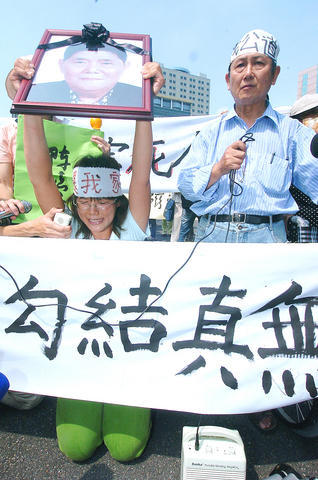More than 20 environmental protection activists petitioned the Executive Yuan yesterday, requesting the government lay out stricter measures regulating electromagnetic waves (EMW).
"The regulations governing EMW are not strict enough. Unfortunately, the government will not do anything about it," said Chen Jiau-hua (
"As there are an increasing number of cellphone towers, the electromagnetic waves are getting stronger in the environment. It is quite ridiculous that the government is now planning to establish more than 10,000 WiMAX towers before we have laws for EMW related issues," she added.

PHOTO: LIU HSIN-DE, TAIPEI TIMES
WiMAX stands for "worldwide interoperability for microwave access." It aims to provide wireless data over long distances, in a variety of different ways, from point to point links to full mobile cellular type access.
In its petition, the union submitted five requests.
It asked the National Communications Commission not to issue operating licenses for any WiMAX towers before the government guarantees that their EMW are harmless and requested that existing cellphone towers decrease their strength to six volts per meter.
Those aged 16 and below must not be allowed to use cellphones, the group suggested.
The group also asked the government to postpone the establishment of campus wireless Internet networks before the technology is proved to be harmless and relocate cellphone towers, power stations and high-voltage power line towers away from campuses, residential areas and hospitals.
The union provided a list of people who had died of cancers, which they alleged were related to EMW pollution.
The union said that the people lived close to Chianan Church in Chiayi City, which has a large cellphone tower on its roof.
The statistics provided by the group showed that 12 residents died of cancer between 2004 and this May.
"There is insufficient evidence to prove that these residents died from the effects of electromagnetism, but no one can guarantee that their cancer had nothing to do with it either," Chen said.

A preclearance service to facilitate entry for people traveling to select airports in Japan would be available from Thursday next week to Feb. 25 at Taiwan Taoyuan International Airport, Taoyuan International Airport Corp (TIAC) said on Tuesday. The service was first made available to Taiwanese travelers throughout the winter vacation of 2024 and during the Lunar New Year holiday. In addition to flights to the Japanese cities of Hakodate, Asahikawa, Akita, Sendai, Niigata, Okayama, Takamatsu, Kumamoto and Kagoshima, the service would be available to travelers to Kobe and Oita. The service can be accessed by passengers of 15 flight routes operated by

GIVE AND TAKE: Blood demand continues to rise each year, while fewer young donors are available due to the nation’s falling birthrate, a doctor said Blood donors can redeem points earned from donations to obtain limited edition Formosan black bear travel mugs, the Kaohsiung Blood Center said yesterday, as it announced a goal of stocking 20,000 units of blood prior to the Lunar New Year. The last month of the lunar year is National Blood Donation Month, when local centers seek to stockpile blood for use during the Lunar New Year holiday. The blood demand in southern Taiwan — including Tainan and Kaohsiung, as well as Chiayi, Pingtung, Penghu and Taitung counties — is about 2,000 units per day, the center said. The donation campaign aims to boost

ENHANCING EFFICIENCY: The apron can accommodate 16 airplanes overnight at Taoyuan airport while work on the third runway continues, the transport minister said A new temporary overnight parking apron at Taiwan Taoyuan International Airport is to start operating on Friday next week to boost operational efficiency while the third runway is being constructed, the Ministry of Transportation and Communications said yesterday. The apron — one of the crucial projects in the construction of the third runway — can accommodate 16 aircraft overnight at the nation’s largest international airport, Minister of Transportation and Communications Chen Shih-kai (陳世凱) told reporters while inspecting the new facility yesterday morning. Aside from providing the airport operator with greater flexibility in aircraft parking during the third runway construction,

American climber Alex Honnold is to attempt a free climb of Taipei 101 today at 9am, with traffic closures around the skyscraper. To accommodate the climb attempt and filming, the Taipei Department of Transportation said traffic controls would be enforced around the Taipei 101 area. If weather conditions delay the climb, the restrictions would be pushed back to tomorrow. Traffic controls would be in place today from 7am to 11am around the Taipei 101 area, the department said. Songzhi Road would be fully closed in both directions between Songlian Road and Xinyi Road Sec 5, it said, adding that bidirectional traffic controls would